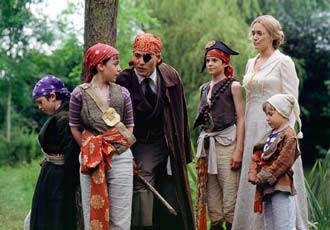|
A celebratory account of the man who found Neverland overlooks the cost to those around him It is best to resist mass hallucinations. "Do you believe in fairies?" asks Peter Pan. When he invites the audience to affirm that belief by clapping, I sit on my hands. It is true that all art demands a willing suspension of disbelief, but it has to be willing, which is to say that self-awareness is what differentiates delusion from imagination. For an individual, unconscious submission to fantasy constitutes psychosis; uncritical embrace of a national myth such as Aryan Supremacy or Manifest Destiny begets collective madness. "Inspired by true events" in the life of J. M. Barrie, Finding Neverland celebrates a London playwright and children's playmate who attained worldly success by withdrawing to an alternative world that he created. The author of Peter Pan, which premiered 100 years ago this year, Barrie was Peter Pan, according to Allan Knee, who wrote the play, The Man Who Was Peter Pan, on which Finding Neverland is based. The film begins in 1903, with the failure of an earlier Barrie play, Little Mary. "I think I can do better," the playwright assures his anxious impresario, Charles Frohman (Hoffman). On an outing in Kensington Gardens with his frisky, friendly Labrador, Barrie encounters four young boys - George, Jack, Peter, and Michael - and their widowed mother, Sylvia Llewelyn Davies. The madcap man and his fluffy dog charm the entire family, and Barrie soon becomes their daily companion, behaving as if he were one of the boys, indulging in the make-believe of cowboys, Indians, and pirates. Barrie helps the brothers cope with the recent death of their father and the fatal illness of their mother, and they provide him with the inspiration for a new play that idealizes the evanescent grace of childhood. With little overt effort, Barrie composes Peter Pan, and, though his actors struggle to make sense of their assignments during rehearsals, the play is a hit with audiences, with Frohman, and, most importantly, with dying Sylvia and her devoted sons. Johnny Depp's Scots-accented Barrie is a fellow fey enough to beguile everyone but Sylvia's wary socialite mother, Mrs. du Maurier, and his own wife, Mary. And, from the privileged perspective of the 21st century, where Peter Pan seems evergreen, we are predisposed to applaud the circumstances of its birth. Scanting the price that others had to pay for Barrie's literary gift, director Marc Forster extols the quest for Neverland as a triumph over dullness and death. (Forster's Monster's Ball took its name from another tactic by which the imagination battles grim contingency, the party given a prisoner on the eve of execution). By the end of Finding Neverland, when we are presented with a splendiferous vision of beneficent fairies hovering over the Davies' backyard, even hostile Mrs. du Maurier, conquered, claps.
Makeup, lighting, and dialogue conspire to reduce Radha Mitchell's Mary Barrie to the status of a selfish, nagging, barren wife, a meager counterweight to Kate Winslet's affectionate, fertile, nurturing Sylvia. Yet Mary is abandoned by her husband, who spends all his spare time romping with the Davies brood. "A grown man playing every day with children," she complains, reasonably, but, for all his imaginative empathy, Barrie is indifferent to the pain he causes the woman he married. When he evades discussing their crumbling marriage, Mary observes, "This is not one of your plays." In a way, of course, it is. We are watching a drama that frames J. M. Barrie as the hero, and anyone who invests two hours and six dollars in the experience of Finding Neverland is likely to be hoping that Neverland is found. Most people go to the movies to escape for a while into another world, the kind of utopia (a word that, like Neverland, means no place) that, like fairies, exists only if viewers are willing to override reason. But, once refreshed by indulging their fantasies, they find it a relief to step outside the theater. Finding Neverland glorifies a boyish man who was trapped in his own imagination. It is stimulating to pass a few hours consorting with hobbits and muggles and ewoks, but it is lunacy to persist in the delusion. While finding Neverland is a wondrous thing, so, too, is finding the way back. •
|


